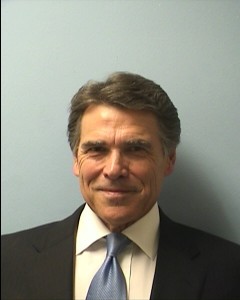McCrum filed two lengthy briefs in answer to a barrage of pre-trial motions filed by Perry’s attorneys. It is the first time the prosecutor has rebutted assertions by the governor’s vigorous defense team. But McCrum didn’t reveal many details in the case that led a grand jury to charge Perry with abuse and coercion.
The first pre-trial court hearing in which Perry will be present is scheduled for Thursday.
On the issue of whether Perry should be provided transcripts of grand jury testimony, McCrum cited centuries-old common law that uses secrecy to help protect all parties involved with criminal allegations.
“Indeed such a principle is even more compelling where the defendant seeking disclosure is a governor, a ‘ruler’ within our structure of government, possessing all the power that led to the initiation of the principle of confidentiality,” McCrum stated.
He cited that the issue of intimidation of witnesses is based on Perry’s own actions.

Rick Perry mug shot at his booking on charges of abuse of authority (Travis County Sheriff's office)
It then quotes “prepared, written comments” used in a press conference the day after the indictments were returned when the governor said, “this farce of a prosecution will be revealed for what it is, and that those responsible will be held accountable.”
Perry was indicted in connection with threats issued in an unsuccessful attempt to force Travis County District Attorney Rosemary Lehmberg to step down.
He said he would veto $7.5 million for a special anti-corruption unit in her office unless she resigned. He pushed for her ouster after Lehmberg had been arrested for drunken driving and was videotaped being obnoxious during booking at the county jail.
At the time of the veto, Lehmberg had apologized, pleaded guilty, served time and checked herself into a treatment program. But Perry said she had lost the public’s confidence and should no longer serve as the county’s top law officer. Perry, a Republican, would have named the Democrat prosecutor’s replacement.
In his efforts to have the indictments tossed, Perry’s attorneys are asserting his constitutional right to veto appropriations, separation of powers and that the veto was privileged speech. They have accused McCrum of trying to criminalize politics.
One of their motions asks the judge to provide them the transcript of grand jury proceedings, which would provide them details of the prosecutor’s case and what to expect from witnesses.
McCrum, a former federal prosecutor from San Antonio who was appointed by a Republican judge, is fighting the unusual request. He asserted parts of the transcripts might be made available as part of pre-trial discovery, but the defense lawyers should not have unfettered access to the grand jury testimony nor have it this early in the process.
He stated in the brief that the Texas Court of Criminal Appeals already ruled “that illegal conduct is not part of the legislative process and is not deserving of privilege.”
McCrum pointed out that two other indicted governors – Marvin Mendel of Maryland and Rod Blagojevich of Illinois – both tried to use legislative immunity and their “appeals were flatly rejected.”
The prosecutor also pointed to Perry’s decision not to appear before the grand jury.
“Mr. Perry chose to not testify before the grand jury, therefore any privilege he now asserts necessarily rests on other witness testimony,” the brief states.
Perry is arguing that the law provides lawmakers immunity from legal action to protect them from lawsuits arising from legislative debate and action.
McCrum said Perry is not a legislator, and lawmakers were given those protections because they must use speech to persuade others to support their bills.
“A governor is not compelled to utter a single word,” the brief stated. “A governor can veto a bill while sitting at his kitchen table.”
Perry’s attorneys also have wanted to see the grand jury transcript to see if any lawmaker was wrongly compelled to waive their rights of protected speech.
McCrum said that Perry has no authority to invoke a power for others retroactively.

